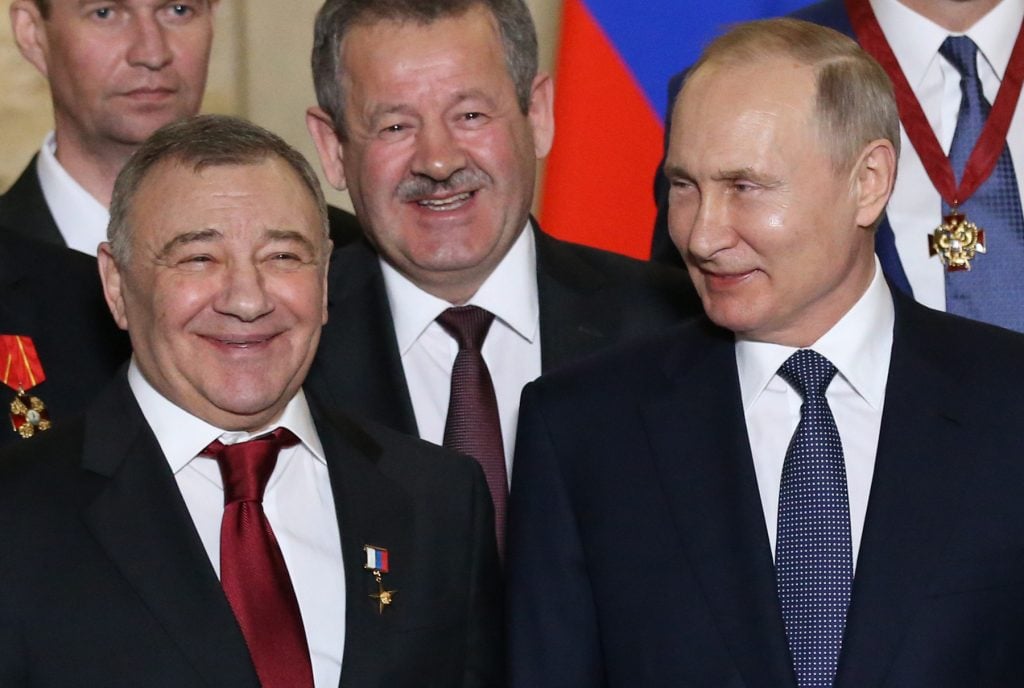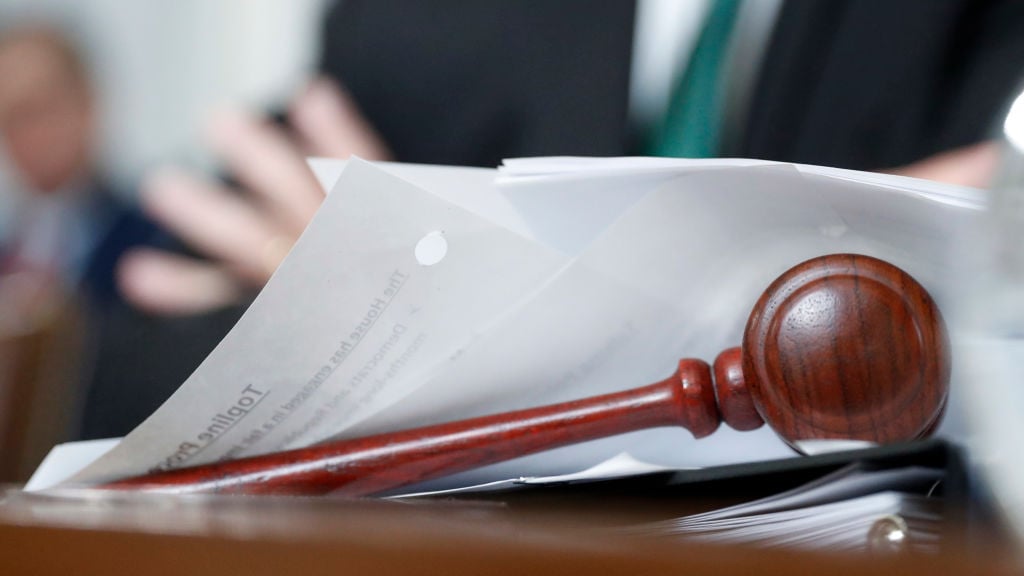
The Gray Market: Why a Senate Investigation Suggests Art-Market Self-Regulation Is Fatally Flawed (and Other Insights)
Every Monday morning, Artnet News brings you The Gray Market. The column decodes important stories from the previous week—and offers unparalleled insight into the inner workings of the art industry in the process.
This week, tracking the trade from Moscow to Capitol Hill…
RUSSIAN TEA ROOM
On Wednesday, the US Senate’s Permanent Subcommittee on Investigations released a searing 150-page report alleging that two Russian oligarchs, Arkady and Boris Rotenberg, used sales and acquisitions of artworks at auction to launder more than $18 million through the US after being placed under economic sanctions in March 2014.
And underneath the mouth-watering, caramelized layer of international intrigue, the investigation’s findings provide a thick base of evidence as to why major auction houses and private dealers are unlikely to effectively self-regulate.
My colleague Taylor Dafoe deftly skimmed some of the most consequential bits off this swamp at Artnet News last week, but here’s my spin on the background.
Hailing from St. Petersburg, brothers Arkady and Boris Rotenberg largely amassed their fortunes via decades of construction contracts and investments directly tied to the Kremlin, including billions of dollars earned through projects for Gazprom, Russia’s state-controlled oil company, and the 2014 Winter Olympics in Sochi.
The report even estimates that Rotenberg-led projects accounted for as much as 15 percent of the entire budget for the Sochi games.
However, US sanctions landed on the Rotenbergs thanks to the enormous profits they reaped through the construction of bridges, railways, and gas pipelines connecting Russia to Crimea after the former annexed the latter by force in early 2014. Incidentally, both Rotenbergs have been close friends with Vladimir Putin since the 1960s, when they began training together in the same judo club as teenagers.
Arkady even “worked as a judo trainer and continued to practice judo with Putin” post-college, leading to the report’s inclusion of this incredible photo. Arkady is also quoted as saying that he considers Putin “sent to our country from God”… which is honestly an understandable cosmology to develop if God is consistently handing you billions of dollars.
According to Senate investigators, the Rotenbergs barreled into the art world by doing business with one unnamed private dealer and four major auction houses after being sanctioned: Sotheby’s, Christie’s, Phillips, and Bonhams.

But each seller told the subcommittee in interviews that, if this was the case, they transacted with the Rotenbergs unknowingly—and despite having voluntarily developed their own anti-money-laundering (AML) protocols to stand in for the state-imposed regulations governing their counterparts in the UK and EU.
And while art sellers’ intel-gathering abilities are indeed limited, reviewing the finer points of this saga convinces me the fatal flaws in their respective self-regulatory efforts are the current incentives of a brutally competitive trade.
THE GO-BETWEENS
A few disclaimers are in order before I continue: neither the dealer nor any of the four major auction houses was charged with any wrongdoing in the report; all four houses fully cooperated with the Senate investigation; and all four likewise permanently stopped doing business with the Rotenbergs’ alleged proxies once they were clued into the situation by investigators.
Still, it’s useful to walk through how exactly they were able to transact with the brothers in between the imposition of sanctions and the federal inquiry. (I’m going to focus on the auction houses because the details are much richer than for the single transaction with the private dealer.)
The report alleges that two key figures enabled the Rotenbergs to short-circuit Christie’s, Sotheby’s, Phillips’s, and Bonhams’s different AML regimens. The first is Mark Omelnitski, an attorney whose conglomerate, the Markom Group, specialized in establishing and managing trusts, corporations, and other fiduciary entities in the UK, British Virgin Islands, Marshall Islands, and Seychelles.
Remember the Panama Papers? You know, those 11.5 million leaked documents from Panamanian law firm Mossack Fonseca & Co. that detailed nearly 40 years of offshore skulduggery by some of the world’s wealthiest people?
The Senate report relays that the Panama Papers connected Omelnitski and the Markom Group to “at least eight BVI [British Virgin Islands] companies” where either the Rotenberg brothers or Arkady’s son, Igor, were named as the Ultimate Beneficial Owner.
It also found that a pair of those eight entities factored into multimillion-dollar art transactions at American auction houses after the US economically blacklisted Arkady and Boris Rotenberg.
The second pivotal intermediary is Gregory Baltser, a US citizen and art advisor based in Russia, as well as the only person to refuse to cooperate with Senate investigators.
Prior to establishing BALTZER, his Moscow-based “auction agency and club,” in 2013, Baltser bought artworks at auction in the name of an entity in Belize called Steamort Limited as far back as 2010.
While the report uncovers that Steamort unquestionably received funds from Rotenberg-linked shell companies, investigators could not definitively uncover who controls Steamort itself, leaving a pinhole in its findings.
Steamort’s lone documented director and shareholder is one Jason Hughes, who the Panama Papers tied to 210 different shell companies. (Passively imagining what this dude’s life is like has taken up a serious portion of my weekend.)
The only other figure ever linked to the company is the mysterious Luisa Brown, who Baltser named as Steamort’s Ultimate Beneficial Owner after being pressured by Christie’s in 2012. Speaking Brown’s name led to this chain of events, which epitomizes a central flaw of any seller’s internal anti-money-laundering safeguards.
Christie’s accepted this verbal assertion, conducted AML checks on Ms. Brown, found no derogatory information, and cleared Mr. Baltser to continue bidding at auctions.
Mr. Baltser never provided any documentary evidence of Steamort’s ownership by Ms. Brown. The Subcommittee was unable to confirm if an individual named Luisa Brown was the UBO for Steamort, or if she even existed at all.
However, the process became even more problematic in 2013 after Baltser set up… uh, BALTZER, whose members were marketed as “the leading Moscow and Russian collectors—the active participants of auction biddings at many world marketplaces.” As of publication time, the company still openly advertises on its website that, “if necessary,” it can enable clients to participate at auction while also enabling them to retain “complete anonymity.”
According to the report, after sanctions were imposed on the Rotenbergs in March 2014, BALTZER made millions of dollars in art acquisitions using funds rerouted through Steamort that originated at shell companies set up by Omelnitski and controlled by the Rotenbergs.
Yet Baltser and his company were able to stay in Christie’s, Sotheby’s, Phillips’s, and Bonhams’s good graces for years because BALTZER (this name thing is killing me) acted as the “principal purchaser,” AKA the party being invoiced and the party paying the houses from accounts it controlled at reputable banks.
There are two structural flaws in this arrangement from an anti-money-laundering perspective: one, the houses lacked the authority to demand Baltser disclose where the money in his accounts came from; and two, they could not legally prevent Baltser from either reselling whatever he’d acquired to a third party, or paying out the sales proceeds he received from a consigned work, to a third party in a separate transaction once his business with the houses was complete.
All of which meant, as the report puts it, “any client due diligence was performed only on Mr. Baltser and not his undisclosed clients, satisfying the voluntary AML policies at the auction houses.”
(The Rotenbergs and Baltser categorically deny the findings of the report. An attorney for Baltser also accused the investigation of doing “substantial collateral damage to BALTZER and its employees,” with the firm being “forced… to largely suspend operations.” )

COMPETITIVE BALANCE
Why would the auction houses accept these shaky arrangements? The obvious answer is money, but we can get more granular than that. To me, the main incentive is competitive pressure—which manifests in two different yet related ways.
The first concerns the competition between sellers and advisors. The report captures the issue in this excerpt regarding its interview with Sotheby’s chief compliance counsel:
She stated that, at times, Sotheby’s has asked dealers on whose behalf they are purchasing an item, but there is an economic disincentive for dealers to provide that information to Sotheby’s. The dealers believe that if Sotheby’s knew the identity of their clients, Sotheby’s would go straight to their client and cut out the dealer.
In short, an art market that thrives on the asymmetry of information is an art market seeded for money laundering, because what you know is your only edge. This naturally limits different parties’ willingness to share data even for legal purposes, and it gives bad actors a defensible excuse for refusing to disclose the ultimate beneficiary of any transaction.
The other competitive pressure is the more obvious one between the different auction houses, as well as, increasingly, between the major auction houses and major private dealers. In the absence of trade-specific government regulations, sellers have to walk a balance beam between protecting themselves with voluntary AML protocols and ensuring those protocols are not stringent enough to steer lucrative clients to more lenient rivals.
(In a statement after the release of the report, Christie’s said it would welcome “the opportunity to work with US legislators on appropriate and enforceable AML guidelines for all tiers of the art trade.”
Sotheby’s stated that it “takes Anti-Money Laundering and United States sanctions policies extremely seriously and voluntarily participated in the Senate Subcommittee’s investigation.” Spokespeople for Phillips and Bonhams also expressed “zero tolerance for evasion of sanctions and willingness to work with the US government on this issue,” per the Wall Street Journal, with Phillips CEO Edward Dolman adding that he was “shocked” by the report’s findings.)
Ultimately, I’m sympathetic to the challenge auction houses and dealers face when it comes to voluntary anti-money-laundering procedures. The Senate report shows how complicated it can be to unmask the end client when shell companies, anonymous trusts, and legit-on-the-surface intermediaries are involved. Intense due diligence also conflicts with the volume and speed of business they need to do to break even, let alone turn a profit.
But without being compelled by the full force of industry-specific federal law, the incentives of the art market virtually guarantee that, despite good-faith efforts by US auction houses and dealers, blue-chip artworks will be used to wash dirty money every now and again.
So either the sell side will need to join hands and implement identical AML protocols to maintain competitive balance, or else government regulation will be the only way to prevent devious transactions from further degrading the trade’s ethical profile.
And it’s time to ask whether the shady clients that serious fiduciary protocols would push out are really more valuable than the reputable clients that serious fiduciary protocols might finally invite in.
That’s all for this week. ‘Til next time, remember Upton Sinclair: It is difficult to get a person to understand something when their salary depends on them not understanding it.










